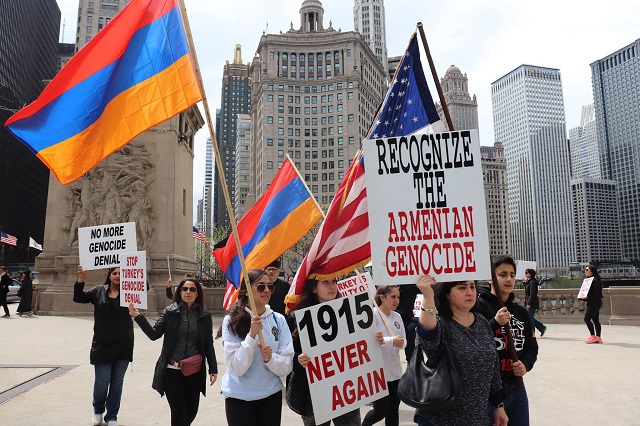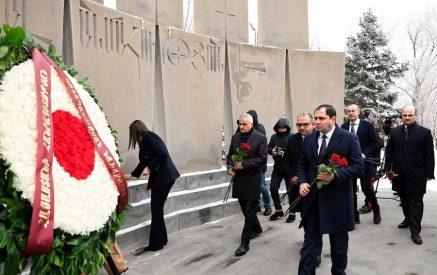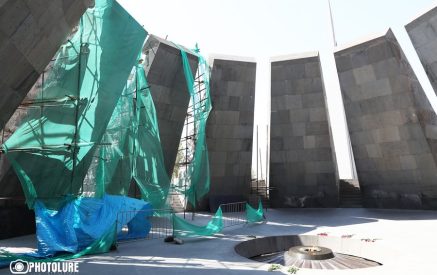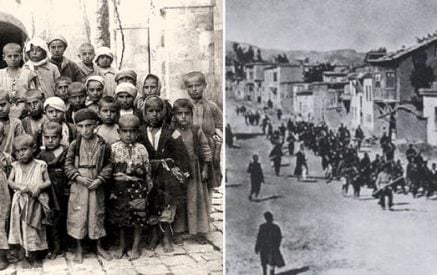The Armenian Weekly. On April 24, 2020 Armenians commemorated the victims of the Genocide perpetrated 105 years ago during World War I in the Ottoman Empire. The Armenian Genocide has ever since been denied ardently by the Turkish State, a denial partly made possible due to the tacit approval of the world community in pursuit of realpolitik at the expense of human rights and justice.
“Forgive and forget” is a common reply to the calls for recognition. “It happened more than a century ago; let’s put it behind us and move forward.” But is it possible? Current Armenian-Turkish relations are living proof of the issue of reconciliation being far from that trivial. On the contrary, the Genocide which occurred over a century ago is highly topical, not only for the two involved nations but also constantly engaging third parties, e.g. the United States. This is mainly due to a perpetuating process known as the politics of memory—utilizing our memories but also shaping them, a process essential in many aspects of our societies, including reconciliation.
Sometimes reconciliation is wrongfully proposed as an outright initial step. In fact, reconciliation is not the first step after a conflict, but rather the final product of several component processes. You can’t just kiss and make up, shake hands and move forward if the committed errors are not acknowledged and addressed adequately. More importantly, forgiveness becomes very difficult if no one acknowledges the wrongdoing and asks to be forgiven. Any such one-sided rapprochement would be superficial and labile as the unresolved issue will constantly simmer and remind both parties, especially the victim, about the elephant in the room.
Reconciliation is instead about a complex process composed of recognition, responsibility and reparation. Although this trinity would constitute an ideal recipe, it is far from the common practice. Often it is the post-conflict power balance which comes to get rid of the issue of responsibility as many of the perpetrators are still around and possess powerful roles in the society. If accused and risking punishment, they could threaten the political stability in the country. This was a major factor in post-apartheid South Africa, in post-junta Argentina, in post-Pinochet Chile, etc. Responsibility and justice were omitted or postponed for the sake of political stability. The compromise was not without scrutiny though, as uttered in South Africa where people said, “We’ve heard the truth. There is even talk about reconciliation. But where’s the justice?” It is only a matter of time when future generations question the scarification of justice as a political tradeoff.
Read also
The same is true about Turkey where the perpetrators of the Armenian Genocide during WWI were the founders of the succeeding Republic. The cleansing of the country from Armenians and other Christians was an important step, but so was the illegal confiscation of their lands and assets, essential for the creation of the republic after a devastating war. Thus, the denial was born early on during the birth of the Turkish Republic to refute any notion of wrongdoing and thereby the risk of liability and reparation.
The early denial, or at least the revisionism to soften the culpability, can actually be beneficial during this crucial stage of state-building. The idea is to fend off the issue of responsibility and punishment for later in order to achieve political stability. Once political stability is in place, the society can, hopefully, with the help of prevailing democratic tools and procedures, start looking into the painful past and address it. Turkey, however, has made the revisionism into its own reality and exported it internationally.
The issues of responsibility and reparation notwithstanding, the question of recognition stands out as the only solid step which cannot be omitted. Two parties cannot move forward if there are conflicting versions of what happened in the past. South Africa did not question whether the apartheid regime had committed wrongdoings; neither have Chile or Argentina questioned their respective regime’s crimes. Turkey, however, not only managed to successfully escape any responsibility for the Genocide but has even succeeded in persistently denying any wrongdoing and persuading the world governments to tacitly confirm the revisionism by resisting calls for recognition.
The recognition is not only about the past though, but very much about the present and the future. A century on, the memories of the Armenian Genocide not only dictate the relations between Armenians and Turks, but also their respective identities and actions. In Turkey’s case the denial and history revisionism not only materialize as the ongoing embargo against Armenia and closed borders, but also in fending off any criticism against the ailing democracy at home. A century ago the Armenians were the “enemy within.” Later the Kurds inherited the title along with any oppositional politicians. Recently it is the Gülenists who are targeted as such to justify the mass-arrests throughout the entire society. After all, why change a concept which works successfully?
Vahagn Avedian
Photo: Chicago Armenians protest for Genocide recognition






















































